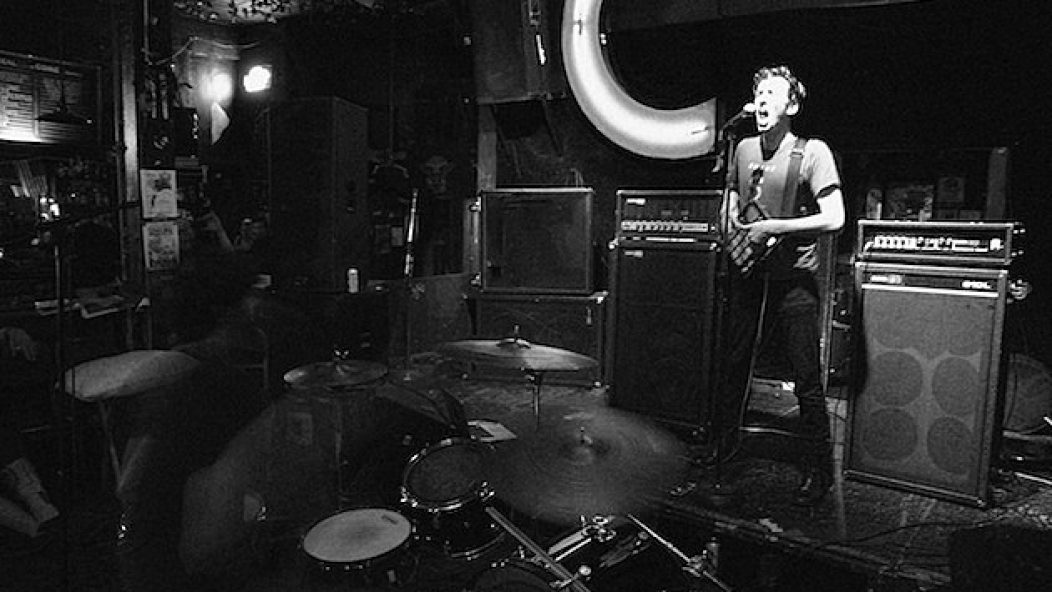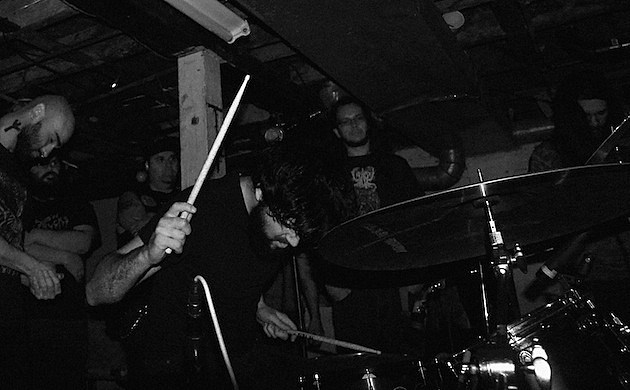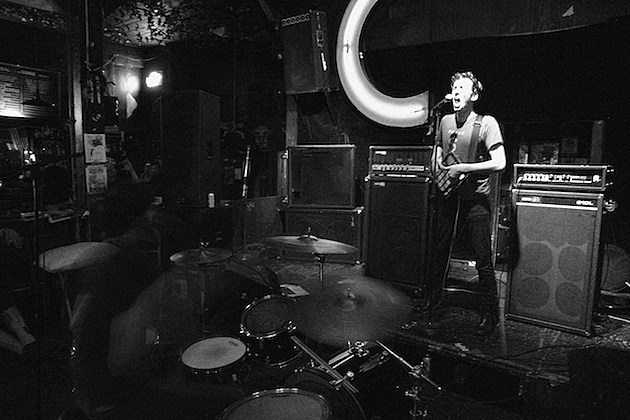
Interview: Wreck and Reference
. . .
Wreck and Reference is a highly irregular beast. Coming out of California, this enigmatic two-piece band pushes the traditional metal template towards regions unexplored, expanding the sonic legacies of Swans’ filth and Big Black’s harshness. It’s ugly, but there’s a deliberate tunefulness to the whole procedure, a hidden beauty of sorts that makes the whole package palatable. And they do it all without the use of stringed instruments: all sounds are made using drums, vocals, and a Korg sampler. As The Flenser Records’ website states, they are “VERY hard to classify.” We spoke with the duo of Ignat and Felix about their influences, the nature and meaning of their often cryptic music, and what the present and future hold for this unique act.
. . .
No Youth by Wreck And Reference
. . .
Your latest album’s title consists of the word “Youth” with a slash through it, which most people claim to mean “No Youth”. What does it mean to you, and how does it reflect W&R’s music and worldview?
Ignat: The album originally was titled No Youth but the strikethrough was an aesthetic choice, and in my opinion representative of a contemporary technology. It seemed more symbolic than literal which is an approach often seen in internet culture, and the symbol Youth as the title presents something more powerful, despite being pronounced “No Youth.”
Felix: Ambiguous aesthetics aside, the album for us served as both rumination on and catharsis of the burdensome concerns we pile upon ourselves. In a period where most people are running blindly to the bar or the beach in search of the carefree, we, perhaps perversely, wallow in the blackened water of angst and unease. If youth is the avoidance of the miseries of reality to which we are entitled, the album is an embrace of these miseries.
I know on the Black Cassette your lineup consisted of a drummer and a multiinstrumentalist mainly working with vocals and samples on an MPC controller. Is there a conscious reason for utilizing samples in place of live instrumentation?
Ignat: We did play live with a guitarist at some point when we were still living in Davis, California. Sam Chiang, he was in a Sacramento crust punk band called Fodder. He ended up moving to Canada. I think it was more “metal” to have him and in some ways also less strange. More importantly though, Felix and I are pretty much on our own exclusive wavelength and with that it’s a lot easier to get the sound and feeling we both really want. We will probably never get another member.
Where do you cull the samples from, and what dictates what samples will go where in a W&R song? An early press release somewhat proudly proclaimed that W&R’s “riffs…aren’t borne of magnetic strings.” Can you defend or explain this hyperbole?
Felix: The primary instrument used for instrumentals on both BC and NY was a Korg PadKontrol used to trigger samples and softsynths in Ableton Live. Samples are, almost exclusively, culled from non-metal sources, partially for the challenge of transforming them into something heavy, partially for the contribution of unexpected sounds, and largely for our own amusement. We have little to say about riffs and guitars. We have an undeniable fondness for both, but Wreck and Reference is an exercise in resisting these tendencies.
Given the unorthodox constraints of your group, how does the songwriting process go? Is one person the lyricist and the other the musician, or is this shared?
Ignat: We don’t really have set responsibilities. We both make instrumentals/samples, write lyrics, drum beats, we even write parts for each other’s songs. I think the songs that are most collaborative come out the most interesting.
When I first discovered W&R, one of the major lyrical influences claimed was Cormac McCarthy (i.e. the track “Evening Redness”). Do those lyrical and aesthetic influences continue unchanged, or have they shifted with the release of the new album?
Ignat: We had both read McCarthy at the time so it was more relevant. It’s not that we are no longer influenced by his prose. Also, there’s nothing worse than a reference-repeater. I think we still draw a lot from literature and philosophy, interpreting our personal lives in the contexts we understand.
Felix: I don’t know how one would go about dropping Blood Meridian from your list of influences, but Youth is in many ways a more personal record, an attempt to capture the malaise we were in at the time of writing.
Here at Invisible Oranges, we have a recurring feature called “The Books They Carry,” about books that artists hold dear. We’ve already discussed the influence of McCarthy’s Blood Meridian; What other writing inspires you?
Ignat: I’ve always been a fan of Camus. I’m about to start The Plague. There’s something about the simplicity of his prose that really captures the objectivity of a situation. The reality present in his work is transparent and things become absurd and dehumanized as you stare right through them. On a side note, Bosse-de-Nage does a great job of achieving this with their lyrics. I’ve read a lot of philosophy too because I studied it formally and that’s been a big influence on my thinking and enriched my mental repository of concepts. But the more analytical stuff is hard to get through especially on busy days like these.
What other artists have you been enjoying of late? And, out of curiosity, does Wreck and Reference base its musical legacy on metal, or are the influences more eclectic?
Ignat: When we started the project we listened to a lot of metal but given our tiny attention spans we jump around a lot. I’m most interested in hearing things I’ve never heard before, at least that’s the goal–but it does take effort to find such things. I’ve really been enjoying the latest Vatican Shadow and going back through his earlier stuff. Fernow has been a pretty big influence on us. I find it interesting that the Vatican Shadow project is so focused in its ideology, namely the propaganda-shrouded involvement of the United States in the Middle East.
Another thing I’ve been listening to today is a band called So Stressed. I saw them at a house show recently and they are worth checking out.
Felix: Our musical dilettantism may not sit well with purists, or even ourselves sometimes, but that hunger for something new and arresting is a big part of our creative process, and at the very least, a reason to get out of bed in the morning.
Wreck and Reference are based out of California. Do your immediate surroundings influence your art?
Felix: Thanks to the Internet, we’ve gotten a lot of support from people all over the world, so our angst definitely isn’t California-specific. I could make up something about the weather, or the diversity, or the cosmopolitanism of California as having an influence on us, but it’s probably the bands and musical communities around us that have had the biggest impact. If you’re into weird and heavy music as much as we are, the Bay Area, Sacramento, and LA are some of the best places to be.
In that vein, what are the lyrical themes of this new album, at least as you interpret them? When I listen to the new album, I hear alienation, mechanization, and depersonalization, like a Bertolucci or Pasolini film.
Ignat: I think the biggest theme on the record is the idea of self-inflicted punishment. This kind of punishment is unwarranted and occurs very much outside of the conscious will, as opposed to something like Schopenhauer’s Will. A person thinks thing X is a remedy for thing Y but really creates problem Z then spends the rest of their sad existence searching for A but of course we’ve already reached the end of the alphabet. Humanity basks in this masochism, showing it off as panacea, confusing medicine with disease. It’s barely noon and with my coffee I’ve done things that are more regression than pro-.
Do you find your music to be in any way spiritual, or is its purpose to reflect a sort of anti-spirituality, a brutal realism that shows spirituality to be a form of “self-inflicted punishment,” as you say?
Ignat: I’m not interested in spirituality, only a reality as objective as can be perceived. I also think that purpose is vanity. People can only interpret the work as they do and any effects they experience are coincidental. When we write we do set out for certain elements to be present in the music but in all our human ignorance who knows if we actually get there. Most times the process is more important than the end result.
Felix: A great deal of the conflict we deal with is reconciling the dispassionate truth we believe in with the passionate hungers that continue to hound us. Spirituality may be a shortcut to reconciliation there, but we would be bored taking it.
How did Wreck and Reference come to be? It seems a mixture of influences, techniques, talents, and ideas that could not simply materialize by chance (no “oh, we just jammed a lot, dude”).
Felix: Half of it has been a conceptual exercise in applying unconventional sounds to intense settings, half of it has been dripping sweat and losing hearing in small practice spaces, more often than not tearing down whatever components of our sound seems superfluous or derivative. Because there are only two of us and we both somehow ride the same aforementioned wavelength, we’re able to be very honest and critical, which allows us to distill our sometimes unruly ideas into something powerful and concise.
Ignat: Wreck and Reference has a really hard time “jamming” because the sample bank takes a while to develop and improvisation is not really spontaneous, which seems to be key in that activity.
At heart, is Wreck and Reference a “doom” band? The press release for the Black Cassette proclaimed it as such, and the music certainly does imitate foreboding, but it isn’t doom metal in the traditional sense. What would you self-classify as?
Felix: There’s a natural and automatic desire to categorize the things you consume and create and we are certainly not immune to this (see our first embarrassing attempt of “electrodoom”). However, we’ve come to the conclusion that this is a fool’s errand for us as we run primarily on the denial rather than adoption of existing musical tropes and techniques. Furthermore, we would feel like frauds/asshats to try to lay claim to territories that those who came before us worked hard to carve out for themselves. So, for now at least, we’re happy to keep mining our hole and chuckle at the ham-fisted and hyphenated genres that get hung above us.
Do you all have particular plans for the immediate or long-term future?
Felix: Since we can’t perform live very often, we have to be frustratingly selective with shows. The upside to that is we’re really excited about all the shows we do get to play. The shows we have coming up are all with artists that we’re big fans of, so that feels good. We’re also slowly constructing new songs, building on the elements we liked from the last record and trying to avoid those techniques we’ve grown tired of. It’ll likely be awhile until anything is fully written, recorded, and ready for release, but it’s coming.
The last words are yours.
Felix: My manifest self-loathing and pretension set my expectations quite low for the reception our music would receive. To see that we are now on the verge of playing with some of our all-time favorite bands, I must attribute our embarrassment of riches to the scores of people who have made the risky investment of not only listening to but sharing our music. For each person we’ve met on the road and at shows and thanked in person, there are dozens more on the internet who have helped prolong this sick trip. Until this ride crashes, I will be spewing gratitude at every turn.
















